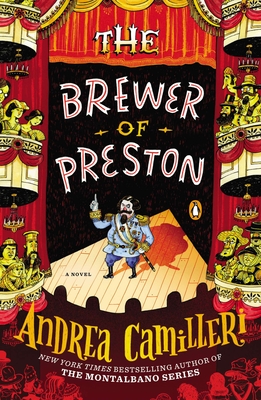The New York Times bestselling author of the Inspector Montalbano series brings us back to Vigàta in the nineteenth century for a rip-roaring comic novel.
1870s Sicily. Much to the displeasure of Vigàta’s stubborn populace, the town has just been unified under the Kingdom of Italy. They’re now in the hands of a new government they don’t understand, and they definitely don’t like. Eugenio Bortuzzi has been named Prefect for Vigàta, a regional representative from the Italian government to oversee the town. But the rowdy and unruly Sicilians don’t care much for this rather pompous mainlander nor the mediocre opera he’s hell-bent on producing in their new municipal theater. The Brewer of Preston, it’s called, and the Vigàtese are revving up to wreak havoc on the performance’s opening night.
1870s Sicily. Much to the displeasure of Vigàta’s stubborn populace, the town has just been unified under the Kingdom of Italy. They’re now in the hands of a new government they don’t understand, and they definitely don’t like. Eugenio Bortuzzi has been named Prefect for Vigàta, a regional representative from the Italian government to oversee the town. But the rowdy and unruly Sicilians don’t care much for this rather pompous mainlander nor the mediocre opera he’s hell-bent on producing in their new municipal theater. The Brewer of Preston, it’s called, and the Vigàtese are revving up to wreak havoc on the performance’s opening night.
Eric B. says:
"Well known for his use of earthy humor in the Montalbano mysteries, this author has a remarkable range as a wordsmith. In this, his second historical novel, these skills are showcased in a highly entertaining manner. Still apparent, and happily so, is the comic voice, but in addition we are treated to a panoply of literary and historical references incorporated into chapter headings and first lines. An appendix to the text lists the sources of these quotations and paraphrases as well as explanations of the meanings of Sicilian dialectical speech and the differences between them and those of, for example, Florence or Rome. The results of these are typically very amusing.
Broad in the theatrical sense of grand gesture and hyperbole, there are passages that are nearly too funny to bear. For instance, the description of a coupling between a widow and a handsome stranger is couched entirely in nautical terms (think a long hawser which becomes first a bowsprit and eventually a mast) that will have you smiling at the least and laughing at best. The uncultured, rough, often common speech and manner of the Vigatanese (this takes place in Vigata, the same Sicilian village of Montalbano’s exploits although set in the 1870s) contrasts with the more refined although often corrupt proclivities of the governmental and societal leaders put in place to “civilize” the unruly Sicilians and bring them into the greater sphere of Italian culture. Mayhem, anarchy, skullduggery of the worst kind and a running petty political fencing involving nearly every citizen of the place proceeds without cease.
The Prefect of the province has decided to inaugurate the newly-built theater in Vigata with a little-known but much-reviled opera called The Brewer Of Preston, an action which is violently opposed by both the intelligentsia, such as they are, and the populus who oppose pretty much anything that comes from outside, especially if it’s imposed by the overbearing mainland officials. The results of this ill-advised scheme are too complex and funny, appalling and confusing, diabolical and maniacal to describe. You must read the book.
At the head of each chapter is a title which is echoed in the first line of text, each one having been taken verbatim or rephrased from various works of literature, history or music. The breadth of the sources is astonishing and in my mind qualifies Camilleri as a genuine scholar of European and Italian culture and anthropology. Don’t fail to follow the references in the appendix as you read along. This is a book to be raucously enjoyed in all its vulgar, bawdy rollicking chaos. Add it to you collection."
Broad in the theatrical sense of grand gesture and hyperbole, there are passages that are nearly too funny to bear. For instance, the description of a coupling between a widow and a handsome stranger is couched entirely in nautical terms (think a long hawser which becomes first a bowsprit and eventually a mast) that will have you smiling at the least and laughing at best. The uncultured, rough, often common speech and manner of the Vigatanese (this takes place in Vigata, the same Sicilian village of Montalbano’s exploits although set in the 1870s) contrasts with the more refined although often corrupt proclivities of the governmental and societal leaders put in place to “civilize” the unruly Sicilians and bring them into the greater sphere of Italian culture. Mayhem, anarchy, skullduggery of the worst kind and a running petty political fencing involving nearly every citizen of the place proceeds without cease.
The Prefect of the province has decided to inaugurate the newly-built theater in Vigata with a little-known but much-reviled opera called The Brewer Of Preston, an action which is violently opposed by both the intelligentsia, such as they are, and the populus who oppose pretty much anything that comes from outside, especially if it’s imposed by the overbearing mainland officials. The results of this ill-advised scheme are too complex and funny, appalling and confusing, diabolical and maniacal to describe. You must read the book.
At the head of each chapter is a title which is echoed in the first line of text, each one having been taken verbatim or rephrased from various works of literature, history or music. The breadth of the sources is astonishing and in my mind qualifies Camilleri as a genuine scholar of European and Italian culture and anthropology. Don’t fail to follow the references in the appendix as you read along. This is a book to be raucously enjoyed in all its vulgar, bawdy rollicking chaos. Add it to you collection."

No comments:
Post a Comment